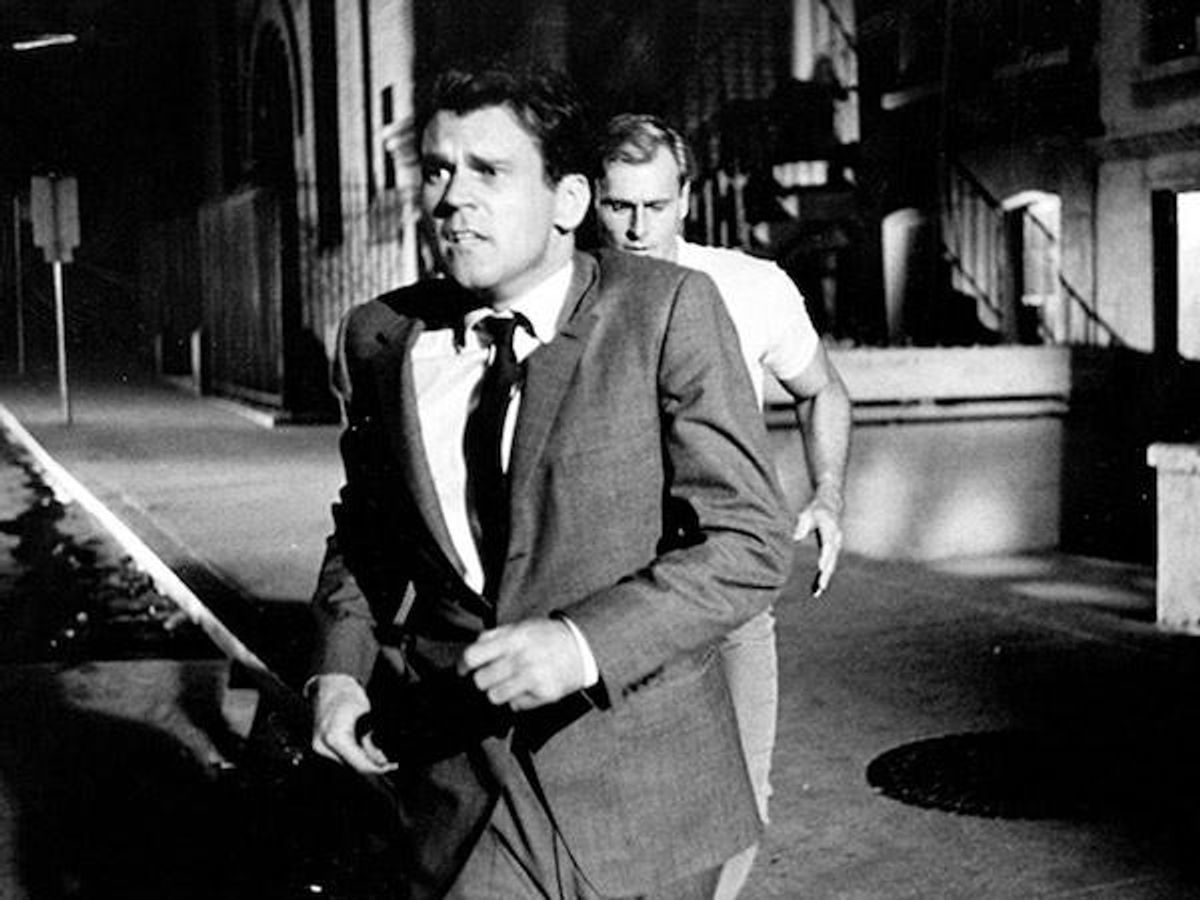Otto Preminger is reputed for his progressiveness in such landmark films as The Moon Is Blue (first blatant screen use of the word "virgin"), Carmen Jones (first erotic black romance), Anatomy of a Murder (first candid sexual discussion) and The Cardinal (first confrontation with abortion as a moral issue). In these movies and others, Preminger challenged cultural barriers, changing Hollywood habits and enlightening global attitudes. And even while it shocked audiences of its day, his 1962 film, Advise & Consent, which centers on gay congressional gossip, managed to raise heads out of the gutter.
Don't feel sanguine -- the closeted senator in Advise & Consent ends up, tragically, still in the closet. But Preminger lifted the lid off the Capitol dome (featured in Saul Bass's famous advertising graphic for the film -- a visual meme). He analyzed how homophobia is politicized in the halls of Congress by detailing methods of lobbying, subterfuge, and intramural voting.

Handsome young Sen. Brigham Anderson (played by Don Murray), who heads a committee to vet a Secretary of State nominee (Henry Fonda), is blackmailed by Sen. Fred Van Ackerman (George Grizzard), who wants to ensure that the nominee is approved. At stake is Anderson's gay affair with a fellow military man during the Korean War, which he hides in marriage and fatherhood described as "a good normal life at home."
Preminger and Murray expose the fallacy of "normal." They don't argue for Anderson's gayness, which would not credibly be a part of '60s Hollywood's ethic, but show the more complicated process of the closet's soul-crushing oppression which condemns one to blackmail, ridicule, and powerlessness. It's Southern senior Senator Cooley (Charles Laughton) who scarily offers Anderson the help of "a powerful, devious friend." That's the way the world -- and Washington, D.C. -- actually works.
Murray has the bland good looks of certain politicians but also of actors who took advantage of mid-20th-century gay eroticism. His Oscar-nominated breakthrough as the macho cowboy lassoing Marilyn Monroe in Bus Stop (1956) anchored Murray in gay playwright William Inge's universe of suppressed sexual longing. But his role in Advise & Consent was an especially risky one, and Murray's furry-chested self-exposure led to the controversial scene of Anderson at a Greenwich Village gay bar (Club 602) desperate to confront his ex-lover and stop the harassment. Preminger was attacked for making this scene "weird," but mainstream Hollywood had never before depicted an actual gay bar, and by today's standards the scene is mild and sedate.
Preminger proves his intelligence (and sympathy) through the gay bar's jukebox song ("Let me hear a voice, a secret voice") as promised in the opening-sequence credit: "Featuring the voice of Frank Sinatra." Meanwhile, the scene of Anderson pushing his blackmailing ex into the gutter does not illustrate Preminger's disapproval but rather is an image of gay self-loathing.
Screenwriter Wendell Mayes aided Preminger in adapting Allen Drury's novel to brilliantly avoid easy partisanship. (They may have been answering Gore Vidal's 1946 gay political novel The City and the Pillar, still yet to be filmed.) We're never told which politicians are Democratic or Republican, thus preventing simplistic audience identification. This achieves a moral balance rarely seen in films about gay identities or politics.
It is Preminger's openhearted gay patriotism that makes Advise & Consent modern. It teaches a lesson about humanity and political honor. A Beltway veteran played by Walter Pidgeon rebukes blackmail persuasively: "We tolerate about anything here. Prejudice, Atticism, demagoguery, anything. That's what the Senate's for, to tolerate freedom. But you've dishonored us. We don't want Brig Anderson's tired old sin made public, whatever it was." This is Shakespearean ("Discretion is the better part of valor").
Advise & Consent is also notable for its great cast, some gay-identified, others just wise: Murray, Henry Fonda, Gene Tierney, Franchot Tone, Will Geer, Laughton, Pidgeon, Grizzard. Like Preminger, they never took bows for gay politics. They just made a good, teachable movie.
Like what you see here? Subscribe and be the first to receive the latest issue of Out. Subscribe to print here and receive a complimentary digital subscription.




















































































